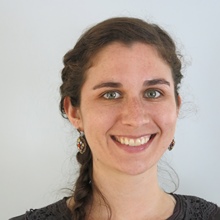Psychologist Studies Resilience in High Risk Populations
Throughout her life, Angela Narayan has been drawn to stories of people who overcome adversity to lead happy, healthy and productive lives.
"My father is from India, and I traveled there several times throughout my childhood. I was always fascinated by youth who were able to 'beat the odds' and grow up to achieve and succeed," said Narayan, a licensed clinical psychologist and assistant professor of psychology. This emphasis on what fosters resilience in parents, children and families who face hardship is a major theme of her research.
Since joining DU in 2016, Narayan has established the PROTECT Lab — Promoting Resilience in Offspring and Targeting Early Childhood Trajectories. Her current research focuses on the pregnancy period as a key link in the intergenerational transmission of risk and resilience from parents to children.
"I want to understand how parents' childhood adversity, as well as experiences of loving care, shape how they transition to parenthood and become caregivers for their own children," she said.
Narayan focuses her research on high risk families, those with higher rates of poverty, mental health problems and acute stress levels, who have the most need for resources and services, but are historically the most underserved. She takes care to use effective yet efficient research methods that reduce participant time and burden, and that provide clinically meaningful, therapeutic experiences and resources to participating families.
"High-risk families are often residentially unstable and have lots of competing priorities — to find housing, stable income, reliable transportation, nutritional food, and effective childcare and schooling — so they are often difficult to engage in research," she said.
Her current study aims to recruit low-income families from the Denver community who are expecting a baby. Graduate and undergraduate students from the PROTECT Lab are helping to conduct a longitudinal study on experiences, relationships, mental health, and plans for parenthood of pregnant women and fathers-to-be. The researchers will follow-up with the parents when the infants are 3-4-months old and again 12-14-months old, to examine how health and wellbeing during pregnancy affects postnatal family functioning, infant development and caregiving.
The study, called BE SAFE Pregnancy — Benevolent Experiences and Severe Adversity in Family Environments during Pregnancy — is an extension of a similar study that Narayan started as a postdoctoral fellow at the University of California, San Francisco. There, she interviewed 101 pregnant women who delivered their babies at Zuckerberg San Francisco General Hospital, and re-interviewed 75% of them when their babies were 3-4 months old.
"A major lesson learned from the BE SAFE San Francisco study was that pregnant women really enjoyed participating in this clinical research study because it allowed them to share their story during pregnancy and also talk about positive experiences, hopes and wishes for the baby, sources of stress and resources for healthy parenting," said Narayan.
Another compelling finding, according to Narayan, was that the pregnant women reported less stress across multiple domains during pregnancy if they had greater numbers of positive experiences and resources when they were children, such as a caregiver whom they felt safe with, a good friend, a teacher who cared and a predictable home routine.
"Women who had more positive childhood experiences reported fewer post-traumatic stress symptoms and less exposure to stressful and traumatic life events during pregnancy, and they were also more likely to return for the postnatal follow-up interviews with their babies, compared to women who had low levels of positive childhood experiences," she said.
For the Denver study, Narayan partners with doctors and researchers at Denver Health, as well as professors in the Stress, Early Experiences, and Development (SEED) Center in the Department of Psychology at DU.



